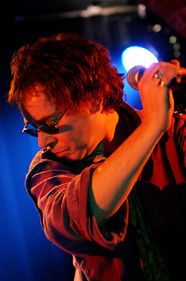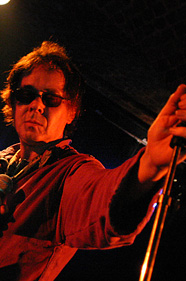The Legendary Pink Dots in concert is a memorably unique experience. I had the chance and the pleasure to see them for the first time in Basel, Switzerland, recently (on December 1st 2004) and really enjoyed the performance.
read the full concert review here
Before their show, the Legendary Pink Dots’ front-man Edward Ka-Spel was nice enough to sit and answer a few questions for Chain D.L.K..
Chain D.L.K.: It’s very nice to sit and talk with you. You seem in good spirits…
the Legendary Pink Dots: aaaahhhh… (laughs) here and there… (the candle on the table goes out) The candle went out as soon as I said that…
Chain D.L.K.: Hmmm, hope that’s not a curse…
the Legendary Pink Dots: I hope not… (both laugh, re-light candle)
Chain D.L.K.: I would like to talk a little bit about the tour. You have been touring an awful lot…
the Legendary Pink Dots: That’s for sure…
Chain D.L.K.: A different city every night: how do you keep up the energy?
the Legendary Pink Dots: Well, it’s a strange thing – mostly you really lose the energy in the days off. We were touring absolutely, indeed rigorously, a show every day for quite a while. And then we went to Greece. We had to get there first and we had to drive the entire length of Italy and take a ferry and so on. And then on the way back it was similar and we had a few days when we did not have shows, and that was when we tended to somehow lose energy, because you get into a rhythm and it’s hard when the rhythm is broken in a way. Even if you are doing nice things like visiting Pompei, which we all did in fact, walked around old ruins and so on. We needed more shows, we needed to get back into the whole… wheel going around again… because it’s like: what do you do when you’re not playing? We all went a little crazy in that time period.
Chain D.L.K.: So you need to go with the momentum?
the Legendary Pink Dots: Ya, we need that momentum. I think it is quite possible that we could easily play 20 or 30 shows in a row, if the drives weren’t too long. Because it becomes like this purpose, this goal, it is relentlessly a strive to achieve day after day.
Chain D.L.K.: It sounds like you really enjoy touring and playing live shows then.
the Legendary Pink Dots: Ya I do, I would say that. No matter what’s going on in your life, after a show I always, well normally, feel this kind of… sense of exhilaration that makes you feel that there is a point. And you need to feel there is a point.
Chain D.L.K.: Do you receive a lot of positive reaction from the audience? And do you feed off the audience energy when you’re playing?
the Legendary Pink Dots: Sure. It varies greatly from country to country, especially in Europe. You do not know how people will react from show to show… makes it a challenge. It goes from the sublime to the ridiculous. Like last night, we played to 30 quite drunk Austrians… not a pretty sight (laughs)… No, actually they’re very sweet in a way, I shouldn’t say that. But then literally just a week before there were like 600 Greek people who reacted in their own very peculiar, very Greek way…
Chain D.L.K.: What way is that?
the Legendary Pink Dots: Well, some of them want to hear the old stuff… and by old stuff I mean 16 year old stuff – it’s like woaaaa, that’s a long time ago, these songs you want to hear! (laughs) And some of them reacted to what we are doing now. We are not an 80’s band, we are not a 90’s band… the band has been going on unbroken. So obviously we are very much focused on what we are doing now.
Chain D.L.K.: Since you have been around for so long and have so many songs, how do you decide what to play and do you play the same set every night or do you change it?
the Legendary Pink Dots: It’s changed a bit here and there on this tour, but mostly in just shuffling songs around and we’ve pulled a few songs into the encores. We do need something to really settle with I find, like a set of songs, in order to develop it. Because if you change the songs too quickly then you feel that you haven’t given that song a fair chance. I think it’s good to give a song a chance to change or to grow. So to have a solid set is not a bad thing. I mean it really has changed since the beginning of the tour. Some songs have just taken on a new life, grown wings… it’s a nice feeling. Even the old ones, because we are playing old songs too, but mostly new interpretations of them.
Chain D.L.K.: What song is requested the most from an audience?
the Legendary Pink Dots: Usually “Belladonna”. But, we haven’t played that one for years (laughs).
Chain D.L.K.: I’ve read the lyrics in some of your CD booklets, they are absolutely beautiful…
the Legendary Pink Dots: Thank you.
Chain D.L.K.: Have you published a book of your lyrics?
the Legendary Pink Dots: There is a book. A friend of mine in San Francisco, she actually had the idea of putting the book together many years ago, but it was very slow to be realized, simply because I was so flaky basically (laughs). But ultimately I had a rush of energy and together we finished the book. Actually she made a lovely job of it, it’s a lovely looking thing.
Chain D.L.K.: Earlier, we were talking about the ring you wear on a chain around your neck. You said that a fan gave it to you. Do fans often give you little mementos and souvenirs when you meet?
the Legendary Pink Dots: Yes quite often…
Chain D.L.K.: What kinds of things have you received?
the Legendary Pink Dots: Well, the last thing I received was a blue rose in Athens. That was really nice, I really liked that. In America, it is quite a lot of things… you get to the end of the tour and you open the drawer and you are overwhelmed with what drops out of it (laughs).
Chain D.L.K.: It was nice to arrive at the show here and see you casually walking around and talking with people. You seem like an out-going, friendly person and you seem to really like your fans.
the Legendary Pink Dots: I like the fans, but I am actually a very shy person, to be completely honest. Off-stage I am actually very nervous.
Chain D.L.K.: Do you feel like you become a different persona on stage then?
the Legendary Pink Dots: It’s still me… but it’s other sides of me that come up that shouldn’t really be revealed in day-to-day normal life.
Chain D.L.K.: No where other than the stage…
the Legendary Pink Dots: It belongs there, truly.
Chain D.L.K.: And, what will you do after the tour?
the Legendary Pink Dots: Oh God… who knows? (laughs). Actually we’ll probably record again… probably it’s the 53rd album, I think… (laughs) I don’t know, I don’t count…
Chain D.L.K.: Another album? That’s certainly good news. Do you feel like you could go on doing this forever and ever?
the Legendary Pink Dots: I hope so! I mean I’ll keep doing it as long as there is something to say and somewhere to go. Because as soon as there is nowhere to go then really you should stop. But I don’t feel that I’m even close to what I want to do yet.



 Just before flying to the USA for an American tour with his band, the generous and charismatic Legendary Pink Dots’ frontman Edward Ka-Spel agreed to answer our questions about the two brand new albums, “The Whispering Wall” and “The Poppy Variations”. It’s also a chance to talk about his obsession about his own music, and to evoke with him the trail-game-like discography of a very unusual band.
Just before flying to the USA for an American tour with his band, the generous and charismatic Legendary Pink Dots’ frontman Edward Ka-Spel agreed to answer our questions about the two brand new albums, “The Whispering Wall” and “The Poppy Variations”. It’s also a chance to talk about his obsession about his own music, and to evoke with him the trail-game-like discography of a very unusual band. Your solo albums have always had some pretty enigmatic titles. By the way, what’s the official title of this one? “Pieces of?” or “Pieces of 8”?
Your solo albums have always had some pretty enigmatic titles. By the way, what’s the official title of this one? “Pieces of?” or “Pieces of 8”?